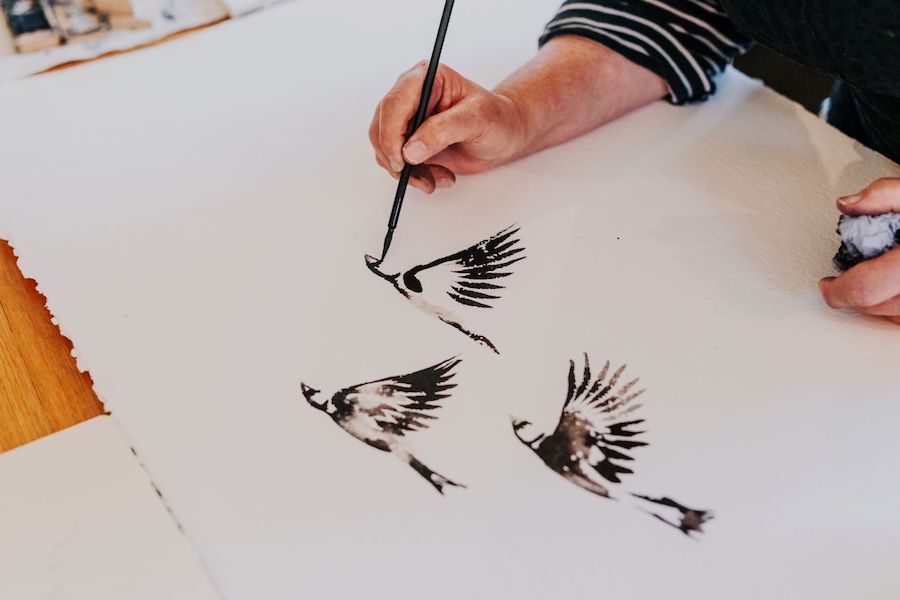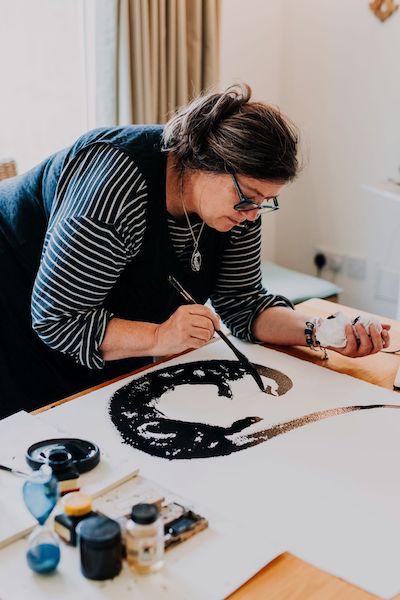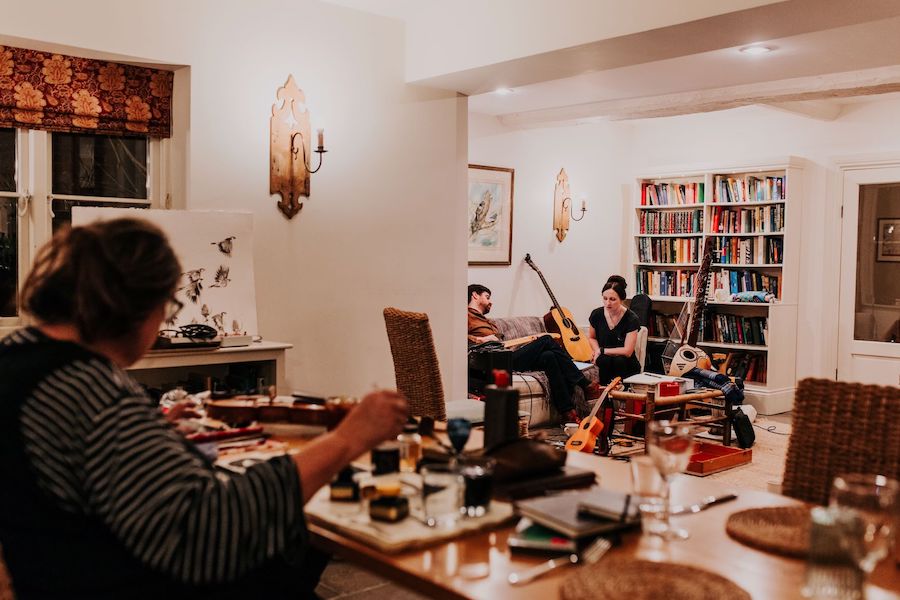What follows is an interview with artist extraordinaire, Jackie Morris, the co-creator of The Lost Words, a breathtaking book, which directly informed our Featured Album of the Month The Lost Words: Spell Songs.
So, first of all, I’d like to say a big thank you for The Lost Words: A Spell Book. This Spell Songs project looked like such a joy to be a part of. Robert’s opening comment for his recent Guardian piece, “it felt like the folk music equivalent of Avengers Assemble” tickled me as I’d thought just the same. There is such an undeniable mystery and magic surrounding the book, how did it feel working so closely and watching the musicians ‘take the spells deeper into the soul’ and seeing how they all interpreted the material?
From the very first moment when we were contacted by our agent and asked about this project, it has felt rather like a dream. I listened to Karine as I worked on the book. Beth and The Bookshop Band have travelled with me for a long time in my van, and Seckou has been in my life for many years also. All of the musicians have provided a soundtrack to my working life, so to be working with them is astonishing. Listening to them shaping the music from the silent intimacy of reading and looking has been an education.
I was really interested to read about the book’s relation to end of life/older-life communities and in dementia cases. Many of my fondest memories as a child were spent with my Grandfather (who worked for National Geographic for a spell) as he taught me the names of the various countryside flora and fauna. Now we’re able to share that again; I see someone who evidently struggles with names and faces, vividly recalling creatures and plants by their Latin names. It reminded me of music’s power to trigger memories in dementia/Alzheimer’s cases. Then there is the book’s amazing influence in deprived areas of Britain. As you said, it is without a doubt a book “for people, not for children”. I was wondering if you have any favourite instances of how the book has reached people in different ways and how this feels to be a part of?
Almost every day Robert and I are sent stories about children, reluctant to read, who spend hours in the pages of our book, about children who have turned away from screentime into the book. Robert’s spells have been read at weddings and funerals.
A woman wrote to me and said she had come to the UK to see her 95-year-old father. She lives in Australia now and he has been living with Alzheimer’s, and they thought he had reached the stage where his language had gone. He’d not spoken for a long while. She gave him a copy of the book and he slowly turned the pages, becoming more absorbed. When he reached the bramble page he began to talk about blackbirds, about his childhood in Dorset, and later when shown a picture of his wife he remembered her name. Many people have said they’ve spent rich time with their parents, older relatives, in the pages of the book.
A 98-year-old woman said she had bought one to share with her great-grandchild. She had 19 of them (great-grandchildren – as she pointed out as 19 of the books would be very heavy for a 98-year-old woman to carry), but this one, well, she loves the natural world, she said. 98, fierce bright and loving life. People have found refuge in the pages of our book at the end of their lives and what a compliment that is, when you know how little time you have left but you spend it in the book.
The book has brought us new friends, like Joe, like Diane, who found a place to breathe, a scent of the wild in it.
What does that feel like? It leaves you lost for words. Sometimes broken, but always mended. And every person who brings such a story teaches us more. There’s no one favourite. It’s overwhelming, utterly overwhelming, in a good way, beautiful.
Stitch music into the soul of the book and I hope together we can reach more people.
“People are using the book, every day, and every day teaching us more about it.” This ‘beautiful protest’ of yours certainly doesn’t seem to be losing any traction. Often when musicians discuss the release of a new album, they talk about the music becoming public domain and ultimately an unpredictable force that then moves beyond them.
I was wondering how you felt about the cultural phenomenon of The Lost Words now? It has a wildness of its own, there’s a genuine sense these spells cast might will more creatures into existence – one fan shared “My awareness was heightened. I know people call this ‘frequency illusion’. I call it natural magic!”
With it crossing disciplines and reaching diverse audiences how do you feel the record and live performances might take it further? Do you feel its reception also suggests a wider recognition in people that they do feel disconnected from the natural world? It seems more common in general, is it now more important than ever to remedy that?
I think there is a realisation growing that nature isn’t something apart from us, but that we are a small, infinitely small, part of it. I think the book is part of a forest of books that attempt to focus attention onto the more than human. I know that music can take it deeper.
The aim of the book was to change focus, to bring into light the everyday, close by, natural world. What is under the nose isn’t always noticed. The aim of the music, I hope, is to take these spells deeper into people’s hearts and souls. Music and memory link in such strong ways. New stories, new songs, I think we are all hungry for this.

I find it fascinating the ways in which folk music and environmental protest can intersect, as Macfarlane put it “Folk tradition’s long double allegiance to landscape and protest aligns precisely with the book’s own purpose.” Many artists are harnessing the power of song as a form of ‘Abstract Activism’ as Sam Lee referred to it when promoting his Singing With Nightingales project. We’ve seen Jim Aldridge & Sid Goldsmith up in arms, Rowan Piggott with his bee-lore & folksong: Songhive project and of course Karine’s wonderful Wind Resistance. Do you feel folk music and more art, in general, might develop this stronger environmental conscience, or rather is it more where you look for it and how you read into art that is already out there?
I grew up with the songs of Leon Rosselson, Ewan MacColl, Dick Gaughan and later Rory McCleod and others. They taught me history, as well as protest. They taught me about land rights and trespass. They taught me about other singers in other countries.
I’m not sure Spell Songs is folk music. In the way that The Lost Words isn’t a children’s book, rather a book for people, the Spell Songs is also out of any category. It is music, shaped around the book, but wilder, sung from the heart, and I hope that it will reach out to people. In these times I think we all need a lifeline. I met someone not so long ago who had come from the USA to see The Lost Words exhibition. She said Robert’s work was almost all that was keeping her going through The Trump Years. She was in tears. Spell Songs is for people like her. A sonic haven.
Following on from that, in Daegan Miller’s interview for Public Books, Macfarlane suggests: “Perhaps we shouldn’t think of books as saving the world, but rather as catalysing uncountable small unknown acts of good – to think about the ways in which small acts can together, cumulatively, grow into change. In this way we might think of writing as like the work of a coral reef, slowly building its structures through many small interventions, rather than like a single thunderclap or silver bullet. You always are threatened by quietism, but I think that to give up for the lack of a silver bullet is wasteful.”
Sometimes it can seem difficult to stand your ground against the pressures of climate change and the cavalier actions of certain politicians. I was wondering how you felt about literature and art’s power as a form of (environmental) protest in the 21st Century?
I’m not sure how to answer this. So, this is what I can say. I paint. I have always made a living as an artist. I’ve been lucky in that over time my clients have been New Statesman, New Socialist, Oxfam, Greenpeace, Amnesty International, New Internationalist. When I have worked on books I have told the stories I want to tell and they have found enough of an audience for me to continue to work. I paint from the heart. I try to paint beauty and it’s hard, always turning to the light in a world so filled with troubles. And I write, I paint, to try to make sense of the world. I would rather create than destroy. I can speak only for myself.
There is another thing though. As you reconnect your soul with your place in the natural world you realise what a farce and a sham politics is and how broken is a system that sees such people in positions of governance. And yet we are stuck with this broken system and there is no way to make the best of it. We need new dreamers to find a new way, new stories to shape the future, new songs, always, new songs.
For the album artwork you decided to paint each musician as a creature, how naturally did this idea come about? I enjoyed hearing more on your blog; “Jim was a barn owl at first. But then he changed. He’s quiet. Listens. But when he opens his mouth to sing, he has a beautiful voice. So, he’s a lark.” It reads like the diary of a keen birdwatcher, was there a feeling of waiting for the musician’s ‘spirit animal’ slowly to come into focus?

I don’t think of them as the animals/birds being their ‘spirit animal’, rather that they are the creature’s spirit person. Each person has about them something of the creature. Some are harder to find as they flit between species. Robert is the snow hare at the beginning of The Lost Words. Drawing is all about looking, at the shape of a thing. These days I am watching birds, trying to catch their shape. All of the musicians became birds in my mind’s eye. There’s something of the raven in Kris Drever, even in the way he loves to play with effects and sounds. Karine has always been a wren. Julie was the hardest, and she flitted around shorebirds until she settled as a lapwing, and now this just seems so right. There’s a lightness about her, but pale skin, dark hair, a dancing grace, and colour so rich in her voice that also wavers like the flight of a peewit.
Obviously, both Macfarlane’s and your own work have deep ecological ties, was there a key moment when you felt this was something that you desperately needed to pursue and could you ever have imagined it would have this kind of impact around the time of its conception? From tending it from seed to sapling and now to its myriad branching spin-offs – do you feel there’s still new ground left to be broken?
In 2015 Robert and I walked into the offices at Hamish Hamilton with a painting, a spell, an idea. No one really knew what this would become. It was so hard to explain what we were trying to make, but Simon Prosser, our editor, had faith in us. We hoped that what we were making would be a large and gilded spell book and over the next two years we worked, with Hermione Thompson, with Alison O’Toole, to bring it to life. In just over a year it has become a touring exhibition, a building, music in many forms, outdoor theatre, perhaps a film, always a book. Now we have eight musicians, sell-out tours and this CD. Let’s see what Spell Songs becomes.

The Lost Words: Spell Song is released on July 12th and is a Featured Album of the Month, you can read the review here.
David also spoke to the wren…Karine Polwart, and you can read that interview here.
Pre-Order via Folk by the Oak (CD Book| Double LP). Tour posters and original artwork by Jackie Morris are also available.
Photo Credit: Elly Lucas
Artwork: Jackie Morris
